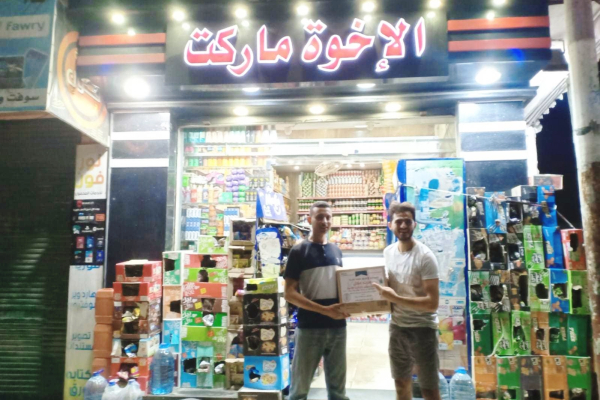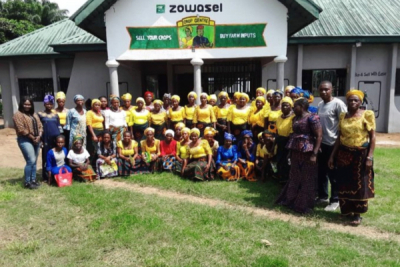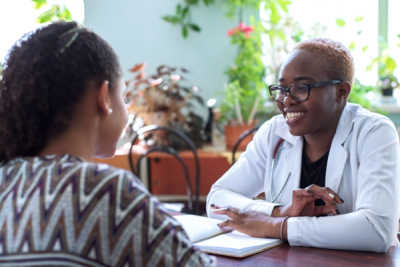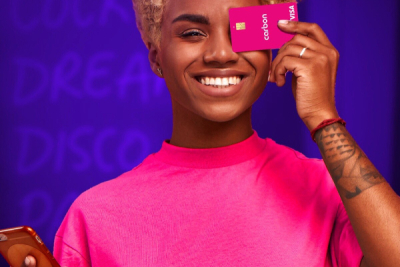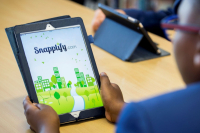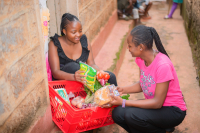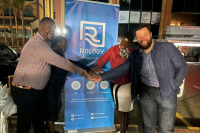
Solutions (581)
The solution was set up by local tech entrepreneurs to compete with large commercial groups in the b2b segment.
Kuzlo is a business-to-business e-commerce solution developed by an Egyptian startup. It allows retailers to source their products from wholesalers at competitive rates.
The Alexandria-based startup behind the solution was founded in 2021 by Ayman Elgarem, Mohamed Gebril, Yehia Elsaka, and Tarek Gamal. It aims, among others, to transform traditional retail into a digitally connected network. To that end, it has raised about $100,000 to accelerate its growth and develop new products.
“Kuzlo is helping small retailers shift into the new future challenges and support them to strengthen their business value using new digital trends of e-commerce and e-finance in the near future,” explained Ayman Elgarem in 2021.
Through its mobile app -available for Android and iOS devices, users can register for Kuzlo accounts and access the network of wholesalers and suppliers. The network features more than 10,000 fresh, dry, and frozen products while guaranteeing product availability, on-time delivery, and competitive prices.
Kuzlo claims more than 50 wholesalers and suppliers, which facilitates negotiations and guarantees good deals. It has more than 1,000 retailers in the three cities where it is present. It caught investors’ attention early but, its growth started recently. The Android version of its mobile app has been downloaded more than a thousand times
Adoni Conrad Quenum
In most African countries, foreign languages -French, English, Spanish, etc…- are the working languages. So, mother tongues are seldom taught. As a result, the number of children speaking or even understanding those mother tongues has shrunk and continues to shrink. In recent years, however, the government and even private actors are devising solutions to that issue. This includes Ambani.
Ambani is an edtech solution developed by a South African startup. It allows users to learn several local languages such as Sizulu, Sisixhosa, Sepedi, Setswana, Tshivenda, or Swahili by playing games or watching specific videos. The startup that launched the solution was founded, in 2018, by Mukundi Lambani and Nkulu Lambani. Based in Johannesburg, its goal is to provide interactive native language instruction to K-12 learners.
“Ambani is here to help educators find the right blend of tools, platforms, and components to fit both learners and teachers' needs,” the startup informs on its platform.
The solution has a mobile app accessible on Playstore and Appstore. Once registered, users can access the content available on the platform such as slides, videos, or even custom-made games that facilitate learning.
Ambani also offers online tutoring for children over six years old. These are individual lessons given by qualified language teachers. The courses are accessible with monthly subscriptions and learners can buy specific lessons to fill gaps in their learning if they don’t want to commit to monthly subscriptions.
The startup also uses augmented reality to make learning fun and especially experiential. "When you view the books through the app on your phone, they COME ALIVE in 3D," it says.
The Android version of its mobile app has been downloaded more than 10,000 times, according to Play Store data. In 2021, Ambani was distinguished at the MTN Business App Year Awards. It won awards for the best educational solution, best gaming solution, best South African solution, and best solution of the year. The edtech received $68,000 and plans to introduce other African languages such as Yoruba, Shona, and Xitsonga.
Adoni Conrad Quenum
In Africa, delivery services have been proliferating in recent years despite addressing issues. The delivery services mostly encountered on the continent use bikes and cars but, in Ethiopia, six tech entrepreneurs have decided to introduce environmentally friendly delivery means.
Tikus Delivery is a digital solution developed by the Ethiopian start-up Avenir Technologies. It allows its users to have meals delivered from various restaurants by bicycle or electric motorcycle. The startup, based in Addis Ababa, was founded in 2019 by Amir Redwan, Bereket Solomon, Bruk Getahun, Tesfa Mesele, and Yasin Aman, to support local restaurants and create jobs for the youth.
“Because bicycles don’t need fuel to operate, Tikus customers can enjoy a lower delivery charge which is 6 ETB ($0.11) per kilometer, and deliveries are made eco-friendly.[...] Bicycles are more affordable than motorbikes, which means more people especially young people can start earning money as Tikus Bikers with a small initial cost,” indicates Amir Redwan.
Through its Android and iOS apps, users can create Tikus accounts and then gain access to the startup's partner restaurants. In a few clicks, they can choose a restaurant to select a menu, validate their orders, and checkout. They will then be delivered in a relatively short time. The apps even give the choice to follow the delivery process in real-time.
The apps automatically calculate the delivery fees based on distance and delivery means chosen. Deliveries by bicycle are charged 25 birrs for the initial kilometer plus 6 birrs for each additional kilometer. The fee for deliveries by bike is 35 birrs for the initial kilometer plus 10 birrs for each extra kilometer.
The Android version of Tikus’ app has been downloaded more than 10,000 times on Playstore. Thanks to support from the Bridges program and Mastercard Foundation, Tikus wants to create a thousand jobs in Ethiopia.
Adoni Conrad Quenum
Data science and artificial intelligence have improved processes and helped optimize results in several industries. Building on the opportunities they present, some Nigerian tech entrepreneurs decided to put them at the service of agriculture and online commerce.
Zowasel is a digital solution developed by a Nigerian startup. It enables smallholder farmers to use technology to improve their productivity, sustainability, and profitability across the value chain. The Lagos-based agritech startup that launched the solution was founded in 2019 by Jerry Oche and Oghenekome Umuerri. It aims to leverage data science and artificial intelligence to validate and secure the agricultural value chains, from farm to market.
To achieve that goal, it developed an Android app, which enables farmers to access its network of agronomy experts who evaluate productivity and strive to improve crop quality to attract good buyers.
Zowasel also checks buyers’ information such as their creditworthiness before connecting them to farmers. "We match buyers and sellers of the same commodity. [...] You decide on pricing and terms together, Zowasel enforces smart contracts and ensures that all transactions are shipped and payments are made after delivery without any issues," the platform indicates.
In 2021, the agritech startup claimed it was working with more than 1.5 million smallholder farmers in northern Nigeria. That same year, it secured $100,000 in funding from Guinness and Prosimador at the Zero Hunger Sprint 2021, an event held in Lagos and supported by the World Food Programme. Although it has launched operations in the Niger Delta to support smallholder farmers there, expansion outside Nigeria is not yet on its agenda.
Adoni Conrad Quenum
The healthtech startup behind the solution was launched after a discussion, between its co-founders, on the lack of affordable healthcare in their country (South Africa). After that discussion, they decided to mobilize qualified healthcare professionals to find a solution to that challenge.
NOOSi is a healthtech solution developed by a South African start-up. It connects -virtually or in person- nurses to people who need home health care. The Cape Town-based healthtech was founded in 2021 by Sumarie Roodt and Catherine Williams to create a community where healthcare is accessible to all.
“NOOSi was started because we wanted to revitalize the South African healthcare system. We believe that this can be done by using a “tech4good” approach in a way that gives hardworking nurses new and better job opportunities and gives patients a way to get affordable and accessible healthcare,” explained Sumarie Roodt.
To access its services, users need to set up their NOOSI accounts through the solution’s web platform. The startup has a skilled workforce to perform every task, from chronic disease management care to mental and psychiatric care. The platform embeds a search bar where one has to fill in information such as the address of the potential patient, the services he/she needs, and the category of the service.
NOOSi always suggests the best nurse for every task since each of them is specialized in a particular area. When users select the nurse they want, they can contact them directly on Whatsapp to book their services. The rates applied depend on the services requested. Currently, the healthtech solution is only available in the Western Cape. The startup is typing to expand to other provinces before a possible international expansion.
Adoni Conrad Quenum
The fintech solution was launched by founders with over 20 years of experience in the African financial sector. With their experience in the industry, they know the challenges faced by populations when accessing the services offered by traditional financial institutions. So they set Carbon to address those challenges.
Carbon is a fintech solution developed by the Nigerian start-up OneFi. It allows access to digital banking services. The startup behind the solution is based in London and Lagos. Founded in 2012 by Chijioke Dozie and Ngozi Dozie, it has raised over $15 million in VC funding to accelerate its growth in Africa.
Through its mobile app -available for Android and iOS devices, users can register their account in just a few minutes and start accessing its services. Carbon also has a USSD code for potential users living in areas with no or poor access to the internet.
Among other things, the fintech allows users to pay bills, transfer money or get loans instantly. It has even integrated a feature that allows users to exchange messages when closing deals.
Every deposit on the platform is insured by the Nigeria Deposit Insurance Corporation. In other words, the insurance company protects depositors and guarantees the settlement of insured funds should the fintech solution become unable to refund deposits. In 2021, it signed a contract with Visa to issue digital and physical debit cards.
“Carbon is focused on delivering an unparalleled banking experience that is both safe and reliable across all touchpoints.[...] We want more customers to enjoy some of our popular products like Carbon Zero through their Carbon card, and the key to achieving this is our partnership with a leading payment and fintech-friendly company like Visa,” said Chijioke Dozie at the time.
In 2020, the fintech claimed about 659,000 customers and over $241.35 million in transactions processed. In addition to Nigeria, Carbon has a presence in Kenya and Ghana. Its ambition is to become a pan-African digital bank for Africans and the diaspora. The Android version of its app has already been downloaded more than a million times.
Adoni Conrad Quenum
The rapid population growth has caused major problems with urban transport in major African cities. Between traffic jams and the quality of road infrastructure, Some find it wiser to take traditional transport means: cab taxi.
SafeBoda is a digital solution developed by a Ugandan startup. It is, among other things, an on-demand urban transport and financial service. The Kampala-based startup behind the solution was founded in 2015 by Ricky Rapa Thomson, Alastair Sussock, and Maxime Dieudonné.
According to the startup, “right from day one, SafeBoda has been [the] safest option for affordable rides within the city. Innovation being one of its core values, and now with the Bank of Uganda license, SafeBoda is creating a whole lot more value for its community of customers and drivers in Uganda.”
Through its Android and iOS apps, users can create their accounts to access its services. The solution that was only for on-demand cab taxi service introduced car transportation and now offers additional services including last-mile delivery, e-commerce, fee-free money transfers, bill payment, etc.
“We are building a global product that is going to be available in cities across Africa…and SafeBoda will continue to build better services that will allow us to serve the population better and grow beyond Uganda so that anyone in Africa will have access to services just by clicking a button. We will also make sure that the lives of our drivers are improved,” says Ricky Rapa Thomson.
Users can pay for their rides and services via the integrated SafeBoda wallet that can be loaded by mobile money, agents, and even drivers. The startup even offers up to 10% interest on unused funds in users’ wallets.
The startup said that in Kampala alone, it has achieved over 30 million safer rides. Building on that achievement, it started its continental expansion, launching in countries like Nigeria and Kenya.
According to Play Store, the Android version of the super application has already been downloaded more than a million times. Despite fierce competition from international firms like Uber and Bolt in the on-demand transportation segment and Jumia in e-commerce, SafeBoda is not wavering. Although it had to pull out of the Kenyan and Nigerian markets for various reasons, it is focusing on its growth in Uganda to re-launch a new expansion plan in the coming years with its investors’ support.
Adoni Conrad Quenum
The digital solution was launched to facilitate access to educational books. Initially launched in South Africa, it is now aiming for the West African market.
Snapplify is an edtech solution developed by a South African startup. It provides easy access to recommended textbooks. The Cape Town-based startup was founded in 2011 by Wesley Lynch.
The solution has a mobile app accessible for devices running Android or iOS. Through the app, a user can create an account and access the electronic versions of the books and textbooks. The catalogs vary from country to country due to applicable laws and depending on the textbooks used in the concerned country.
In 2022, the start-up began its West African expansion project since many regional institutions are registered on the platform. "Schools and tertiary institutions are looking for high-quality educational resources that are pertinent and suitable for their region. [...] Snapplify is providing them with exactly that," Wesley Lynch says.
Snapplify is growing rapidly, with offices in South Africa, Kenya, the UK, and the US. It has raised about $2 million to accelerate its growth in new markets. Its userbase is also growing fast as proven by Play Store data. Since its launch, the Android version of its mobile app has been downloaded more than 100,000 times.
Adoni Conrad Quenum
The solution was launched by a former Jumia Kenya executive and some of his colleagues. It aims to lower the cost of living.
Kapu is a business-to-customer platform developed by a Kenyan start-up. It allows users to shop online at lower prices. The startup was founded in 2022 by Sam Chappatte, a former executive vice president of unicorn Jumia, to help African consumers reduce living costs and save $1 billion over the next 10 years.
“People spending like 40 to 50% of their household income on the grocery basket is a big problem for society, but it is also a huge opportunity … The reason we started Kapu is that we think there is a more relevant model of e-commerce that can be built to target the grocery basket, which is the biggest portion of spending for the vast majority of consumers. And if by using technology we can bring efficiency then we can have a tremendous impact on society for consumers and businesses,” Sam Chappate told Techcrunch in 2022.
To be more effective, the solution has introduced a variety of technologies for order placing. First, users can place orders on its web platform. Apart from the web platform, they can also place orders through its Android app or on Whatsapp. To place orders through the web platform or the Android app, users need to create accounts.
With its 1,500 relay points in Nairobi, the startup delivers orders the next day. “Customers receive a notification from Kapu and also from the agents, to go pick up their goods. Many agents also deliver to consumers’ homes,” said Chappate.
The startup is not yet covering the entire Kenyan capital but, it already claims some 1 million orders and $300,000 saved by customers. Its app has already been downloaded more than 5,000 times according to Play Store data. After raising $8 million in December 2022, it hopes to cover all of Nairobi before entering other Kenyan cities.
Adoni Conrad Quenum
The healthtech solution was developed by a group of entrepreneurs who aim to help people access competitive radiology services.
Rology is an AI platform developed by an eponymous Egyptian start-up. It enables patients to easily book appointments with radiologists. The Cairo-based startup behind the platform was founded in 2017 by Amr Abodraiaa, Moaaz Hossam, Mahmoud Eldefrawy, and Bassam Khallaf to address the shortage of radiologists in Africa.
Via its web platform, users can book an appointment with radiology specialists. They can go live within a few minutes after completing the usual formalities. The startup also offers a free trial. In both cases, users need to fill out a form by providing information such as name, hospital, or type of analysis. After the appointment, the patient receives a report from the specialist within twelve hours, and, in case of an emergency, the report is available within 90 minutes.
Rology works with about 100 hospitals and has completed several rounds of financing ($1 million in total) to expand into Africa and the Middle East. It is now present in eight countries.
In 2020, when the startup raised $860,000, co-founder Amr Abodraiaa said: "for the last three years we saw firsthand how Rology’s services help hospitals offer fast and accurate care to their patients and how it can save patients’ lives. We look forward to expanding Rology’s platform to the African and Middle Eastern market where there is a huge need for Rology’s services and ultimately help hospitals offer better care to their patients."
Adoni Conrad Quenum
More...
In Africa, only a few tech entrepreneurs embrace the legal sector. Yet, legaltech solutions will be very useful for the broader dissemination of all kinds of legal frameworks governing every type of person, protecting against abuses, and defending rights.
Legal Doctrine is a digital solution developed by an Algerian startup. It allows users to access legislation, regulations, and court decisions from several Francophone African countries. The legaltech startup behind the solution is based in Algiers. Founded in 2018 by Walid Ghanemi, it wants to ensure that every African business and institution has transparent access to the laws it is governed by.
“Legal Doctrine transforms a wide range of data into exploitable information that allows decision-makers and practitioners to monitor all legal news daily,” the platform indicates.
Through its Android or iOS apps, users can set up their Legal Doctrine accounts to test the platform with the free trial option or request subscription information.
The legaltech builds up its legal library with the jurisprudence of Algeria, Tunisia, Morocco, Senegal, Côte d’Ivoire, and Cameroon.
“Thanks to its powerful indexing and search by keywords features, Legal Doctrine’s Legal Search engine allows you to quickly identify the most relevant legal information on which you can elaborate your strategy,” the solution explains on its platform. Its platforms are localized in English, French, and Arabic. Currently, it claims some 4,000 subscribers, over one million searches in 2020, and 15 million in 2021. On Playsotre, its Android app has been downloaded more than 5,000 times. In 2018, Legal Doctrine won the “Best African Legaltech Startup” in Zurich. In 2019, it won a similar award in Tunis.
Adoni Conrad Quenum
Motorcycle taxis are one of the most widely used transport modes in Africa. But, the sector is sometimes disorganized and hailing bike drivers can be a hurdle. In Rwanda, a start-up wants to make bike hailing easier.
Yegomoto is an urban mobility solution developed by the Rwandan start-up Yego Innovision Ltd, a subsidiary of the Singaporean firm Kommlabs. It allows Kigalians to easily move around town on their preferred transport mode, motorcycle cabs.
Through its mobile apps -available for Android and iOS devices, users can request a bike ride or even hail car drivers. Its motorcycle taxi drivers are identifiable by their bright-red helmets. So, if a user doesn’t want to or is unable to book a ride through the mobile app, he/she can just hail the Yegomoto drivers on the roadside and easily get to their destination. In the two cases, once at the destination, the cost of the ride is displayed by meters, allowing the user to pay via mobile money, the Tap and Pay card, or Yegomoto’s Ride-tap-Pay card.
In addition to public transport, the start-up is active in last-mile delivery. Since its launch, the Android version of the application has been downloaded more than 10,000 times. Yegomoto claims more than 16,226,575 trips and more than 84,820,632 kilometers traveled. It plans to launch in Harare and Bulawayo, Zimbabwe before eying other African countries.
Adoni Conrad Quenum
Africans are increasingly turning to e-learning. Since the Covid-19 pandemic, interest in this sector has increased and local tech entrepreneurs are offering tailor-made solutions, adapted to the needs of the population.
Teesas is an edtech solution developed by a Nigerian start-up. It helps users -children notably- improve their understanding of various topics and subjects and learn indigenous languages. The start-up, based in Ikeja, was founded in 2020 by Osayi Izedonmwen. It raised, less than two months after its launch, $1.6 million to develop its technology and better position itself in the Nigerian market.
“Teesas provides a platform where educators and learners engage seamlessly and efficiently, to facilitate a fun and effective learning experience via the deployment of technology and the adoption of local culture and dialects,” the startup indicates on its web platform.
Users can access its content through its mobile applications developed for iOS and Android devices -the Android version has been downloaded more than 100,000 times from Playstore. To allow their children to access the contents, parents can register accounts and select the subjects their children are struggling with or local language courses. The content is inspired by the Nigerian national curriculum, which makes it easier for learners.
Osayi Izedonmwen explains that "live classes deal with concepts where learners have challenges. The learners sit with teachers in small remote classes of 10 or 15 for a personalized engagement, and to get more rigor into the teaching process.” Access to the content requires a subscription (starting from $6 monthly).
The solution also has dedicated Android and iOS apps for parents to track children’s progress in the selected subjects and languages. It provides access to information about opportunities for improvement and personalized learning data. "We foresee a future where kids don’t have to attend in-person classes because they can cover entire curriculums on an app, and be ready enough for their secondary school entrance exams," Osayi Izedonmwen indicates.
Adoni Conrad Quenum
After its launch in 2017, the insuretech company struggled to gain ground in the South African market until 2021 when it suddenly grew by 200% in the first semester.
Pineapple is an insurtech solution developed by a South African eponymous startup. It allows users to purchase insurance policies online
On its web and mobile (Android and iOS apps) platforms, the solution offers a multitude of insurance policies users can buy after they set up their Pineapple accounts. Among others, Pineapple offers insurance for cars, bikes, smartphones, fire, theft, leaks and floods, power surge, or accidental damage.
Before subscribing, users can request and receive record time quotes and policy details, and benefits.
In some cases, the insuretech offers discounts on some policies. For instance, if a car insurance subscriber travels less than 300 kilometers per month, he/she will get a discount that can go up to 30%.
According to PlayStore data, the Android version of its mobile app has been downloaded more than 100,000 times. In 2019, the South African insuretech won the top prize in the annual VentureClash competition in the US. It was awarded $1.5 million, an amount that the executives invested in the development of the startup. Also, since its launch, it has raised some $9.1 million to support its growth. In July 2021, when it secured ZAR80 million in Series A round, it announced that in the first six months of the year, it grew by an unexpected 200%.
Adoni Conrad Quenum


